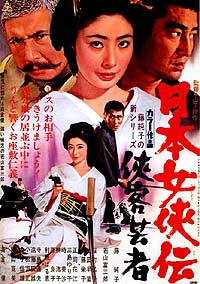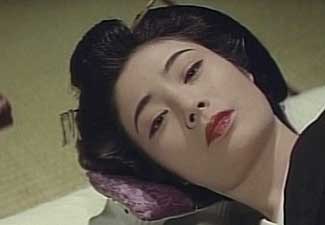 Behind the opening credits for Samurai Geisha aka The Chivalrous Geisha (Nihon jokyo-den: Kyokaku geisha, 1969), we see Junko Fuji as Shinji performing a beautiful traditional geisha dance.
Behind the opening credits for Samurai Geisha aka The Chivalrous Geisha (Nihon jokyo-den: Kyokaku geisha, 1969), we see Junko Fuji as Shinji performing a beautiful traditional geisha dance.
This was the first in the "Tales of Chivalrous Women" series that ran to five films each starring Junko playing different women.
Now available on subtitled dvd as Samurai Geisha, the back of the jewel case shows a poster from a completely different film, in which Junko Fuji fights with longsword. But this one would more accurately be called The Chivalrous Geisha as it was on the subtitled 35 mm print. Unlike some of the entries in the series, she is not the fighting kind, except in spirit.
It's the end of Meiji & beginning of the Taisho era. Officially the class system is abolished & modernism has set in. For a woman of the old samurai class, however, there might be only the same options as for women of former times who have no such family connections. Thus Shinji provides entertainment for men.
She has been hired for the night by soldiers. Tomisaburo Wakayama plays their their uncouth leader Sakata. He & his men are too crude & too drunk to appreciate the distinction between a trained geisha entertainer & a prostitute.
When she wallops Sakata for grabbing her roughly, young soldiers take her aside threateningly for assaulting the Imperial Army. They demand "more than an apology!" but she refuses, boldly telling them, "I don't care if you hit me or cut me to pieces." Her boldness inevitably wins the day, & Wakayama's uncouth character softens with admiration for Shinji's spirit.
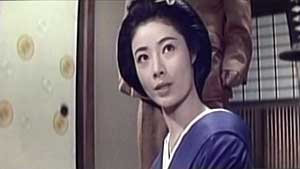 All the Hakata geishas of Tokita house are famous as the "geisha bandits," & men come knowing full well they can't leave until their purses are empty. The house accepts only customers who can afford the jest of being "robbed." All the Hakata geishas of Tokita house are famous as the "geisha bandits," & men come knowing full well they can't leave until their purses are empty. The house accepts only customers who can afford the jest of being "robbed."
In the nearby mountains coal miners risk their lives for small incomes. Three men on their way to the mines step into the geisha house with what seems to them a fortune, ten yen, though it's not even close to what these women cost.
Shinji takes pity on these poor hardworking bumpkins & goes to them with two other girls to pour them sake & entertain them with samisen & dance. They're overwhelmed by the beauty & privilege of being treated as wealthy gentlemen all evening.
Wealthy coal mine owner Osuga (Nobuo Kaneko) had expected her that evening. A gangster boss wants to buy Shinji for the mine owner, but Shinji refuses. She insists on entertaining poor miners, who said that such a night would be remembered by them their whole lives.
Shimada is also a coal mine owner. Hs company is small. Because he has concern for the safety & well being of every worker, he is a beloved boss. He comes looking for his three miners, & becomes angry that they have behaved foolishly. He insists on paying Shinji the usual high price of her services, but she insists she's already been well paid.
She says, "You don't know our kokuro heart." And Shimada admits, "I was wrong." But he refuses to let her pour him sake, causing one of his men to laugh, "He gets drunk just by inhaling fumes!"
Soulful-eyed Shimada is played by Ken Takakura, the biggest star of the decade, the best & most frequent co-star for films starring Junko Fuji. They have the magic of Bogart & Bacall, making a heroic pairing & fans who love them separately love them even more together.
In many of their films as co-stars, he's the good yakuza up against bad yakuza, but in this film, he's a small-time businessman who owns the mineral rights to a small but coal-rich mountain. A rival, very bad fellow in the same business, Osuga, is a tycoon who wants to take over the smaller company. This villain doesn't care about the welfare of miners, operating exclusively in greedy mode, & willing to use the services of his gangster associates to get what he wants.
 Young lovers, Kota & Suzue, are trying to escape from the girl's contract to work as a prostitute for yakuza. They run into a house to hide, & there meet Shinji, who strives to help them. She takes Suzue in to hide her, & Kota is sent to to Shimada's mountain to hide.
Young lovers, Kota & Suzue, are trying to escape from the girl's contract to work as a prostitute for yakuza. They run into a house to hide, & there meet Shinji, who strives to help them. She takes Suzue in to hide her, & Kota is sent to to Shimada's mountain to hide.
Usuga the greedy boss pretending to be chivalrous intervenes for Suzue, so that Shinji finds herself beholden to a rat whose workers are slaves & whose mines are Hell.
As the film progresses, the greedy mine owner & his gangster buddies get more & more grotesquely evil until the good working men of Shimada's mountain suffer from every persecution.
Tomisaburo Wakayama's "war minister" character returns from the front a war hero & looks up Shinji. He says to her, "You're one of three people who smacked my head in my life. The other two are my father & Saigo [i.e., Saigo Takamori, a conservative patriot]. Since then, I'm afraid of hitting girls."
The minister wants to drink with Shimada, who can't drink. Shinji offers to drink in his behalf. This is acceptable to the war minister, but boss Usuga is present at the gathering & insists she do so from an enormous bowl. She exclaims "I accept!" Six sake bottles fill the bowl.
This is in emulation of a famous scene from the tale of Yoshitsune & the monk Benkei, when Benkei drank heroic amounts of sake in a situation that would ward off danger to Yoshitsune. Though Junko does not have the "fighting" scene in this film she has in many others, this drinking sequence is a psychological equivalent.
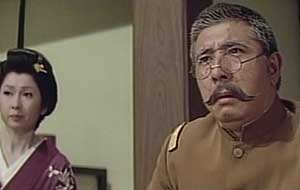 When she drinks so much with the war minister, he is deeply moved, & is nearly tearful when he praises her, "Great job Shinji! Thank you!" When she drinks so much with the war minister, he is deeply moved, & is nearly tearful when he praises her, "Great job Shinji! Thank you!"
She replies humbly, "This was something little for me, to honor Japan's greatest mountain," meaning Shimada's mine. The tycoon's attempt to humiliate her has more than backfired. She then does her famous geisha dance but with staggering imperfections that have the effect of greater beauty.
As a love story, Samurai Geisha is effective because Ken as Shimada is so sweet & beautiful, & of course so is Junko as Shinji. But ninkyo films are about chivalry in times of crisis, not about happy love affairs.
Shimada admits to Shinji that he is an ex-con, twice imprisoned, for terrible things done as a drunk. It's why he never drinks. He poses as a decent citizen, "but once you do something wrong, you're scarred for life. Please don't tell anyone!" She tells him of her scars as deep as his.
But she also finds out he's expected to marry another girl, obviously someone too giddy & foolish for him, but Shinji withdraws from showing affection for Shimada, because she feels her station in life makes her unworthy. And so she offers herself (while morosely drunk) to the villainous Osuga who has long wanted to buy her. Her price, she insists, is that Osuga stop interferring with Shimada's coal shipments.
However, Shimada arrives before the bargain can be finalized, insisting such an arrangement is unacceptable. "This is the woman I love! I am am taking her with me!" Of Yayoi the girl he was supposed to marry, he says, "She'll find a better man than me."
They walk together on the riverbank in the rain, but under separate umbrellas, symbolically weighty as an omen because well-fated lovers share a single umbrella.
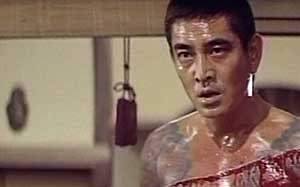 Another mine owner committed suicide when ruined by Usuga's machinations.
Another mine owner committed suicide when ruined by Usuga's machinations.
One of the geishas of Bandit House loved the man & so attempted revenge, but only wounded Usuga. Geisha Bandit House is thus at risk of being closed down.
Geishas throughout the area stop serving Usuga, & even for such a man as he, sake is bitter with no girl to pour it.
Gangters are sent to push girls around. Shinji turns out to have a pistol in her sleeve & scatters the gangsters, saying, "Tell Usuga to apologize to us or the lights of Hakata will vanish."
It becomes national news when the red light district goes dark in Hakata. Everyone knows there's a strike due to the evil deeds of Usaga.
All the while, Shimada's unshipped coal has accumulated horribly because Usuga has threatened shippers. And an attempt has been made on Shimada's life.
About then Army Minister Sakata visits again, his second visit in a month. The girls still won't work until Koman, the girl who attacked villainous Usuga, is out of trouble.
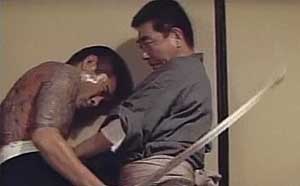 As Usaga wants to continue to impress the war minister, he says he forgives Koman & for girls to please hurry to the party in honor of the minister to put on a superb show. As Usaga wants to continue to impress the war minister, he says he forgives Koman & for girls to please hurry to the party in honor of the minister to put on a superb show.
[SPOILERS ALERT!] But even as he behaves apologetically, he has sent yakuza to blow up Shimada's mine.
The Banba gang shows up at the mine with loads of dynamite. Suzue's sweetheart Kota was among those blown up with the mine.
"Taisho! When are we going to fight?" Shimada's men plead, but he won't permit them to do battle. Instead, he insists they build a monument for the men killed when the mountain was dynamited.
We well know that he would give his own life for these men, & we can be pretty sure it's time to make a one-man raid on the yakuza headquarters.
Shinji is the only one who realizes what Shimada will do. She tells him, "I won't stop you. Just tell me. Is it tonight?" A weak woman would have begged him not to do this. She instead gives him her pistol. "Don't worry," he says. "I won't die. You looked so beautiful that night."
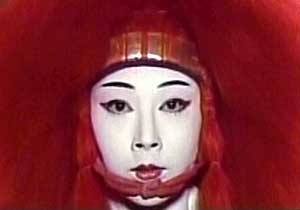 As he begins the final march with sword in hand, a poem runs through his mind: As he begins the final march with sword in hand, a poem runs through his mind:
"I wish I could die under a cherry blossom tree/ Its beautiful petals will fall on my body."
Shinji arrives at the party for the war minister to perform a lion dance at the very moment Shimada reveals his full body tattoo at the Banba gang headquarters, & breaks the plain storage-sheathe off his longsword.
It's a classic one against all ninkyo-eiga (chivalry-film) climax, with Ken at the height of his physical beauty & grace, in a gorgeously choreographed swordfight through the rooms of the gang headquarters.
He takes savage wounds but nothing can stop him. Jump-cuts to Shinji's lion dance imply their spirits are one. In the end, as corpses are being carted away by the police, Shimada's is among them. And Shinji with tears falling prepares for her next customer. [END SPOILERS ALERT]
In all, a fine example of ninkyo-eiga, a well enacted though highly typical role for Ken Takakura, & a chance for Junko Fuji to show some of her traditional dance skills within the context of a moving story.
copyright © by Paghat the Ratgirl
|

